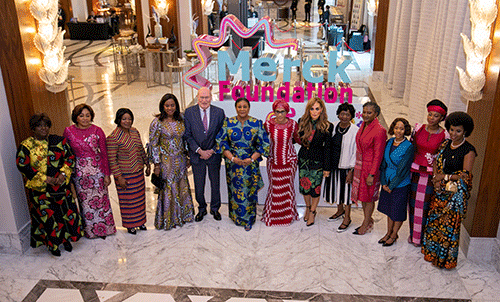African first ladies have expressed dismay at how women are treated when it comes to fertility-related issues, calling for societal change and initiating talks on how to integrate infertility treatment into the public healthcare systems.
First Lady Monica Geingos said they saw a high number of women who are rejected by their partners due to infertility issues, and who started to use alcohol.
The World Health Organisation (WHO) defines infertility as a disease of the male or female reproductive system defined by the failure to achieve a pregnancy after 12 months or more of regular unprotected sexual intercourse.
In the male reproductive system, infertility is most commonly caused by problems in the ejection of semen, absence or low levels of sperm, or abnormal shape (morphology) and movement (motility) of the sperm.
In the female reproductive system, infertility may be caused by a range of abnormalities of the ovaries, uterus, fallopian tubes, and endocrine system, among others.
“We had to intervene on psychosocial issues like substance abuse, but also refer them to psychological treatment and support services, and assist them to access legal services, because often, there are divorce proceedings as a result, when family mediation doesn’t work,” said Geingos at the celebration of Merck Foundation’s fifth anniversary in Dubai earlier this week.
Merck Foundation, established in 2017, aims to improve the health and wellbeing of people and advance their lives through science and technology. The efforts are primarily focused on improving access to quality and equitable healthcare solutions in underserved communities, building healthcare and scientific research capacity, and empowering people in STEM (Science, Technology, Engineering, and Mathematics) with a focus on women and youth. Under the foundation, a first ladies initiative was created.
Merck Foundation First Ladies Initiative Summit (MFFLI) is a platform of African first ladies and Merck Foundation More Than a Mother ambassadors established to discuss challenges, define solutions, measure impact, and share experience to ensure continuous improvement, and exchange variable aspects of different cultures to localise and/or standardise specific messages that can raise awareness and create a culture shift across Africa.
Geingos added: “It’s creating an environment where we all understand that the end goal is to make access and affordability of infertility treatment key as we deal with all of the society’s societal issues. All of us are focused, very much uncovered all of the consequences and issues like infertility that we’ve historically neglected, or even lower in our priority list than what they used to be.”
She said things they saw very clearly are the integration of infertility care with mental health care.
“We certainly had to provide some mental health care support to some of the people who attended the infertility workshops. One of the things that came out the most in the conference was people saying to us, ‘I thought I was alone. I didn’t realise that so many other people are going through exactly what I’m going through’,” recalled Geingos.
Botswana first lady Neo Masisi shared that the country only has one fertility specialist and that women continue to suffer. “Women continue to suffer from social stigma, putting them further at risk of abuse by their partners, family members, and the community.”
She said similar to African states, the accessibility, affordability, and availability of fertility services remain a challenge in the landlocked southern African nation.
“There are a limited number of gynaecologists in the public sector and to illustrate the dire gap in service provision, there is only one fertility specialist who is in the private sector and based in the capital city, Gaborone,” informed Masisi.
Those in the rural areas are automatically disadvantaged as “not only can they not afford the use of these services but they do not have the economic muscle”.
The CEO of Merck Foundation Rasha Kelej said the foundation has made a tremendous impact over the years by building awareness, programmes, and capacity.
“We have provided more than 1 700 scholarships to doctors in 50 countries which is a huge milestone. These doctors are already contributing to the patient care landscape in their countries,” highlighted Kelej.
Chairman and founder of the foundation Frank Stangenberg Haverkamp said the pandemic couldn’t stop the foundation from carrying out its activities and was happy with the progress made in the respective countries, especially the tasks carried out by the first ladies.
“It is an amazing journey full of success stories and significant impact of transforming the everyday lives of many people. The advent of the Coronavirus has enabled the building and enhancing of healthcare capacity, training medical staff at all levels of nations to be our first line of defence,” he said.
He added that governments realised the need to address the gaps in the public health sectors to meet demands of the Covid-19 and the ongoing healthcare needs of the population.
First ladies at the event were from Botswana, Ghana, Zambia, Sierra Leone, Angola, Central African Republic, Mozambique, Malawi, DRC, Burundi, Liberia and The Gambia.
– psiririka@nepc.com.na



